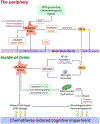Plausible biochemical mechanisms of chemotherapy-induced cognitive impairment ("chemobrain"), a condition that significantly impairs the quality of life of many cancer survivors
- PMID: 30759363
- PMCID: PMC6502692
- DOI: 10.1016/j.bbadis.2019.02.007
Plausible biochemical mechanisms of chemotherapy-induced cognitive impairment ("chemobrain"), a condition that significantly impairs the quality of life of many cancer survivors
Abstract
Increasing numbers of cancer patients survive and live longer than five years after therapy, but very often side effects of cancer treatment arise at same time. One of the side effects, chemotherapy-induced cognitive impairment (CICI), also called "chemobrain" or "chemofog" by patients, brings enormous challenges to cancer survivors following successful chemotherapeutic treatment. Decreased abilities of learning, memory, attention, executive function and processing speed in cancer survivors with CICI, are some of the challenges that greatly impair survivors' quality of life. The molecular mechanisms of CICI involve very complicated processes, which have been the subject of investigation over the past decades. Many mechanistic candidates have been studied including disruption of the blood-brain barrier (BBB), DNA damage, telomere shortening, oxidative stress and associated inflammatory response, gene polymorphism of neural repair, altered neurotransmission, and hormone changes. Oxidative stress is considered as a vital mechanism, since over 50% of FDA-approved anti-cancer drugs can generate reactive oxygen species (ROS) or reactive nitrogen species (RNS), which lead to neuronal death. In this review paper, we discuss these important candidate mechanisms, in particular oxidative stress and the cytokine, TNF-alpha and their potential roles in CICI.
Keywords: Blood-brain barrier; Chemotherapy-induced cognitive impairment; Mitochondrial dysfunction; Oxidative damage; TNF-alpha.
Copyright © 2019 Elsevier B.V. All rights reserved.
Figures


References
-
- Butterfield DA, The 2013 SFRBM discovery award: Selected discoveries from the butterfield laboratory of oxidative stress and its sequela in brain in cognitive disorders exemplified by Alzheimer disease and chemotherapy induced cognitive impairment, Free Radic. Biol. Med 74 (2014) 157 – 174. doi:10.1016/j.freeradbiomed.2014.06.006. - DOI - PMC - PubMed
-
- Moore HCF, An overview of chemotherapy-related cognitive dysfunction, or “chemobrain,“ Oncol. Williston Park N. 28 (2014) 797 – 804. - PubMed
Publication types
MeSH terms
Substances
Grants and funding
LinkOut - more resources
Full Text Sources
Medical
Miscellaneous

